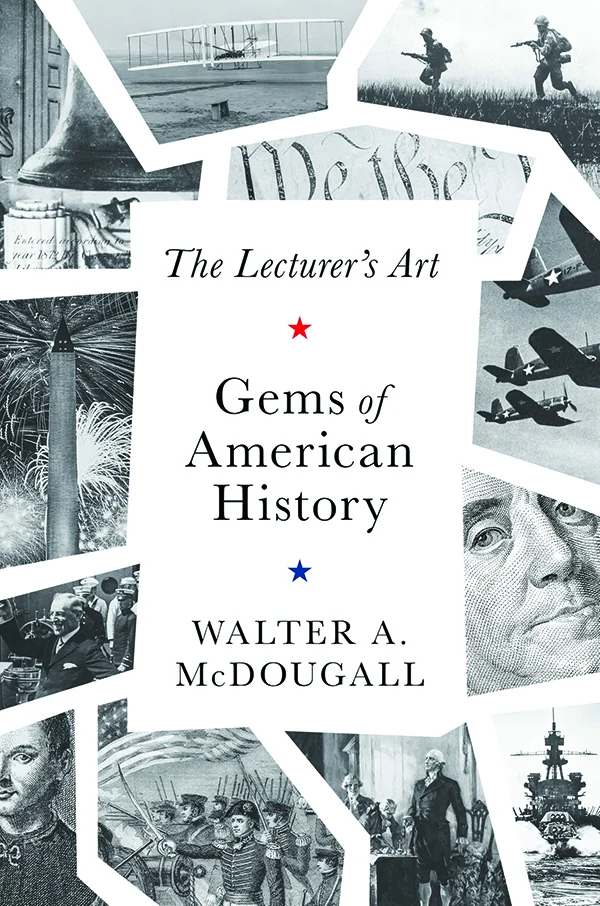In one of the earlier chapters of historian Walter A. McDougall’s recently compiled volume The Gems of American History: A Lecturer’s Art, we are treated to a pregnant aside. McDougall describes a 1790s letter exchange between Charles Thomson, “spy master and eminence grise of the American Revolution,” and President George Washington. Thomson apparently suggested to Washington that they write their own memoirs, since no one but the two of them knew “what really had happened throughout the years of the national founding.” Thomson was presumably referring to all the contingencies that almost miraculously led the colonies to declare independence in 1776, making “thirteen clocks strike as one,” as Second President John Adams put it. “Washington dismissed the idea,” writes McDougall, “because he wished neither to lie to the American people nor disillusion them with the truth. He suggested that they humbly give all the credit to Providence.”
The anecdote stands out in McDougall’s collection of lectures, a rewarding if inconclusive meditation on America’s national character, precisely because it complicates a tidy narrative that McDougall had up until now spent a career refining.
McDougall originally made his academic bones documenting how a particularly Anglo-Protestant intellectual tradition, specifically Americans’ understanding of biblical history, helped shape the United States’s unique approach to statecraft and foreign policy. His writing, both learned and polemical, was a fierce conservative rebuke to the giddy public optimism about the world that followed America’s triumph in the Cold War. His landmark 1997 book Promised Land, Crusader State: The American Encounter with the World Since 1776 split U.S. history into two periods: a more humble, God-fearing era that lasted from the nation’s founding to the start of the Spanish-American War in 1898, and a more messianic era lasting through today, during which American Protestantism turned liberal and cast off the very notion of original sin, allowing itself to attempt to realize Heaven on Earth. For McDougall, the earlier period’s piety is captured in Washington’s Farewell Address and in John Quincy Adams’s “No Monsters to Destroy” speech to Congress, and the latter period’s missionary zeal is embodied in the excesses of preacher-President Woodrow Wilson. In the book’s pages, McDougall himself often sounds like an Old Testament prophet, warning his tribe of the check for divine retribution that’s surely in the mail.

His more recent effort is more circumspect. Gems, though no less attentive to American religiosity, feels less constricted than Promised Land. It reads like a somewhat disorganized, and sometimes repetitive, catalogue of observations from a lifetime of the study of U.S. history that perhaps didn’t neatly fit into earlier projects. But taken as a whole, the book radiates love for its subject. McDougall continues expounding on the same binary understanding of America as in his previous work, seeing the young republic as virtuous and the modern version as having lost its way. But alongside, he explores another source of America’s world-beating success: the “practical men intent on propagating and preserving conditions of liberty.” Their lives, though only impressionistically rendered, yield paradox and improvisation, and the picture of America that emerges is less tidy but perhaps less doomed. This McDougall sounds less like Jeremiah and more like an apostle.
The book starts with an investigation into the idea of U.S. exceptionalism — originally a slur in the mouth of both a Catholic pope and a prominent Marxist from the 19th century, McDougall tells us, against a country supposedly immune to outside influence. In a series of passages truly breathtaking in scope and sweep, he explains that American exceptionalism is tied to an Anglo-Protestant reading of scripture that earnestly focuses on the role of God in worldly politics and the development of self-government. English scholars during the English Civil War learned Hebrew and studied rabbinical literature to understand “whether the Bible ordained monarchy or condemned it, in which case Parliament’s Puritan rebellion against King Charles I in the 1640s was God’s will.” Many, such as John Milton, “concluded that the Lord permitted monarchy but nevertheless condemned it as tantamount to idolatry.” The noisy American experiment, especially in its early years, was so unexpectedly successful that these providential assumptions were all but taken for granted by the vast majority of citizens: God had a plan, and it was America.
But to those living in any one moment in time, it’s impossible to tell the difference between providence and contingency. And contingency seeps thickly through McDougall’s fractured narrative. A lengthy chapter describes Benjamin Franklin’s frantic early attempts to keep King George III and his colonies from going their separate ways; he became “a reluctant republican because the British themselves had thwarted his grand imperial vision.” Another traces the remarkable life of Stephen Girard, a transplant from Bordeaux to Philadelphia who amassed what amounted to the fourth-largest fortune in U.S. history, and who more or less single-handedly kept the country financially afloat during the War of 1812.
And then there’s the celebrated story of Thomas Paine, the “rudely educated son of a Quaker father and Anglican mother,” whose life was amounting to little. “He had failed in two marriages and numerous jobs ranging from corset-maker to collector of taxes on tobacco and liquor,” McDougall notes. “But by chance (or Providence) the colonial agent in London, Franklin, advised Paine to seek his fortune in America.” Pocketing the recommendation, Paine found success in the colonies and was eventually hired by Benjamin Rush to write Common Sense, an essay “weighing the arguments for and against independence.” He delivered a fierce broadside that may well have turned the tide for independence.
Paine was not particularly religious. Nevertheless, “he took as his text the Old Testament prophet Samuel, who rebuked the Israelites for demanding a king when they had the Lord and His prophets and judges to govern them,” McDougall writes. “He invited Americans to heed Samuel’s godly admonition and liberate themselves and mankind from three millennia of oppression.” His rhetorical gifts allowed him to connect in various registers. “Christians reading Common Sense found in it the God of the Bible and a politics derived from religion. Deists found in the pamphlet the God of Nature and a religion derived from politics.”
This unresolvable tension between providence and contingency, and between theism and deism, ultimately softens McDougall’s tone by the end of the book. Though he manages to righteously fume for a bit at Wilson in a chapter titled “The Madness of Saint Woodrow,” he admits that Wilsonian crusading is no less fundamentally American than the godly humility of Washington. Whether Americans’ crusading spirit is ultimately an affront to God or part of His sovereign plan, we can agree that individuals remain the motive force in U.S. politics.
“Public opinion is a crude instrument subject to all sorts of manipulation, short-sightedness, folly, and overreaction: vox populi [the voice of the people] is scarcely vox dei [the voice of God],” McDougall concludes. “But in our democratic system it is sovereign.”
Damir Marusic is an assignment editor at the Washington Post and the cofounder of Wisdom of Crowds.















